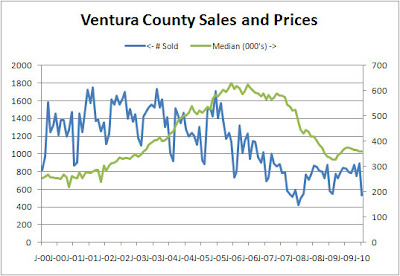MSNBC had an article today on the "flaws" in HAMP modifications. I think it misses the mark almost entirely about the real purpose of the program and also misses much of the publicly available information about HAMP.First on the "Black Box" of the Net Present Value calculation:Under HAMP guidelines, lenders can deny a loan modification if the “net present value” of the new loan is less than the return they would get from not offering a new loan and going through In other words, the official guidelines allow mortgage servicers to base their decision entirely on whether the outcome is in the best interest of the lender or investor, not the homeowner.
Because the Treasury has kept the formula a secret, homeowners who have been rejected for modification can't check the lender’s math to correct possible mistakes about the borrower's income, home value, credit score or other critical pieces of
data.
Just for clarity, the servicer does a calculation and says is the present value of cash flows of the modified mortgage worth more now than foreclosing on the borrower. If the cash flows are worth more now, don't foreclose. The guidelines for the formula itself are on the HAMP servicers site here and here. What is of more interest is the inputs to the formula than the formula itself. If you are negative about price appreciation then it is harder to do loan modification, differences in geography and loss severity will affect the ability to get a modification as well. Also what the return on investment an investor thinks they can get will affect the ease of modification. The servicer is a FIDUCIARY of the investor, not the homeowner. It must have the best interest of the investor at heart. The homeowner doesn't have the right to check the servicers math, they can pay or not pay, that's their choice. The servicers are in between a rock and a hard place. If they want to stay in the servicing business they better listen to their investors but the regulators can make their life hell if the don't listen to them. Add in a new directive coming from the Treasury every week changing the HAMP guidelines and it is no wonder the servicers are paralyzed. We now have the the Tresury telling the servicers not to foreclose in almost all cases while awaiting further HAMP guideline changes. The state of paralysis of the market will reach even more staggering levels. The servicers are being asked to underwrite loans after the loans have been made and if the decision comes out to basically "not make the loan" the Treasury says "then you must be doing it wrong, go back and try again". The loan modification process is easily defrauded. Borrowers are benefitted for reduced cash flows, if you have an extended family and were using money from them living at home to pay your mortgage... just say now that money isn't available and ask for a modification based on your salary (this is just one example, there are many others, especially for self employed or people getting paid under the table). The lender can't tell who is pulling a fast one and who is in need of true help. We are maximizing the loss to the banking system instead of minimizing it. Foreclosing on people gives them a real choice to make. They can step up and pay or lose the house. In areas with a large amount of supply the NPV test leans towards modification, with less supply on the market the investor can liquidate for less loss severity so the NPV test leans to foreclosing. We have had several incredible programs available for rate and term refinances of underwater homes, that should be sufficient to save the ones that can and should be saved. Standard forebearance options should be available for the temporary hardship issues. All the rest should be given the option of paying or going. It really isn't much more complicated than that. Loan modifications aren't a magic bullet for stemming losses, There are no magic bullets. The industry has known and tried modifications before and has seen their flaws.















































